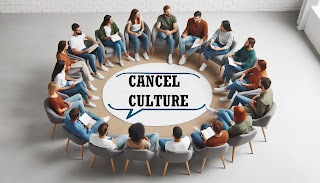As cancel culture continues to grow, its future remains uncertain. On one hand, its rise has led to significant social change, allowing marginalized voices to hold powerful figures accountable for their actions. On the other, cancel culture has become increasingly controversial, raising concerns about fairness, due process, and the long-term consequences for individuals.
1. Evolving Definitions of Accountability
One key area where cancel culture may evolve is in how we
define accountability. In its current form, cancel culture often
revolves around public shaming, which can lead to severe reputational damage,
but it also creates space for those who feel powerless to demand action. As
society continues to grapple with the complexities of accountability, we might
see a shift towards restorative justice approaches—where individuals are
given the chance to acknowledge their mistakes, make amends, and engage in
dialogue with their critics. For example, the rehabilitation of figures like James
Gunn and Kevin Hart, who were initially “canceled” but later
reinstated after apologies, reflects a growing acceptance of redemption arcs.
Studies on justice and forgiveness indicate that restorative
justice is increasingly favored as a means of healing in more nuanced
cases. This shift could signal a move away from a purely punitive system,
allowing people to learn from their mistakes rather than being permanently
exiled. Research in criminal justice has suggested that when people are allowed
to make reparations, they experience a reduced sense of shame and are
more likely to reintegrate into society.
2. The Role of Nuanced Conversations
As cancel culture has gained traction, many critics argue
that it has led to a lack of nuance in public discourse. The quick-fire
nature of social media can result in issues being reduced to simple binaries:
right or wrong, good or bad, with little room for discussion. As a result, we
might see a future in which social platforms, educators, and activists
increasingly focus on fostering dialogue rather than condemnation.
In fact, deliberative democracy, which emphasizes
thoughtful conversation and reflection, could provide a model for more civil
public engagement in the future. This shift would encourage individuals to
think critically about the issues at hand, considering not just the actions of
the accused but the context in which they occurred and the opportunity for
learning. The "cancel culture" of tomorrow could be less about
public judgment and more about facilitating restorative dialogue, where
all sides are heard and individuals are not stripped of their dignity.
3. Impact on the Future of Social Media
The role of social media in cancel culture is undeniable.
Platforms like Twitter, Instagram, and Facebook have
transformed the way social movements and outrage are organized. However, as
concerns about the negative impacts of cancel culture grow, these platforms may
face pressure to change their policies around accountability.
For example, Twitter has already started taking steps
to address harmful behavior by implementing fact-checking mechanisms and
warning labels. These moves might signal a broader trend where platforms
increasingly moderate content in ways that encourage informed dialogue
and reduce the knee-jerk reactions that fuel cancel culture. As social media
platforms evolve, it is likely that their policies will become more
sophisticated, giving people space for reflection, debate, and the opportunity
to engage in dialogue before swift judgment is passed.
Moreover, we may see the rise of alternative social media
platforms designed to foster more positive, thoughtful engagement, similar
to sites like Mastodon or Reddit, which operate around
community-driven moderation. These platforms could provide a space for
conversations that are less likely to descend into mob mentality while
maintaining a focus on accountability and justice.
4. The Rise of Empathy in Social Movements
Another potential evolution in cancel culture is the growing
influence of empathy and compassion. Social movements focused on
equity, racial justice, and LGBTQ+ rights have already stressed the importance
of seeing individuals as complex beings with flaws, rather than simply
categorizing them based on their mistakes. Moving forward, cancel culture could
incorporate more of these values, promoting empathy as an essential tool for
understanding why people make mistakes and how they can make amends.
5. Social Media Fatigue and the Potential for Reform
Another aspect of cancel culture’s future evolution lies in
the fatigue that many individuals and groups feel toward it. Studies on social
media burnout suggest that users are increasingly becoming tired of the
constant outrage and performative activism. In the long term, this could lead
to a reduction in the power of cancel culture, as people grow disillusioned
with its short-term effectiveness and begin to crave more meaningful,
long-lasting social change.
If the public begins to favor more sustainable activism—such
as long-term campaigns that push for systemic change—cancel culture may become
less prevalent. This shift could encourage more direct actions, such as policy
reforms, educational initiatives, or local community efforts, which focus on structural
changes rather than focusing on individual actions.
Conclusion: A Shift Toward Reconciliation
In conclusion, the future of cancel culture is likely to be
shaped by a combination of factors, including evolving definitions of
accountability, the push for nuanced conversations, and the role of empathy in
activism. Social media platforms will also continue to play a significant role,
although the growing concerns around cancel culture's consequences may push for
reforms that prioritize dialogue over condemnation.
Ultimately, if society can strike a balance between holding
people accountable for harmful actions and providing room for growth,
redemption, and empathy, cancel culture may evolve into a more restorative
force. In this way, cancel culture could shift from a divisive, punitive tool
to a more balanced approach—one that allows individuals to learn, grow, and
re-engage with society in positive ways.





No comments:
Post a Comment